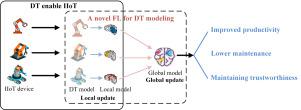当前位置:
X-MOL 学术
›
J. Ind. Inf. Integr.
›
论文详情
Our official English website, www.x-mol.net, welcomes your
feedback! (Note: you will need to create a separate account there.)
Adaptive optimization federated learning enabled digital twins in industrial IoT
Journal of Industrial Information Integration ( IF 10.4 ) Pub Date : 2024-06-19 , DOI: 10.1016/j.jii.2024.100645 Wei Yang , Yuan Yang , Wei Xiang , Lei Yuan , Kan Yu , Álvaro Hernández Alonso , Jesús Ureña Ureña , Zhibo Pang
Journal of Industrial Information Integration ( IF 10.4 ) Pub Date : 2024-06-19 , DOI: 10.1016/j.jii.2024.100645 Wei Yang , Yuan Yang , Wei Xiang , Lei Yuan , Kan Yu , Álvaro Hernández Alonso , Jesús Ureña Ureña , Zhibo Pang

|
The Industrial Internet of Things (IIoT) plays a pivotal role in steering enterprises towards comprehensive digital transformation and fostering intelligent production, which serves as a critical pillar of Industry 4.0. Digital twin (DT) emerges as a highly promising technology, enabling the digital transformation of the IIoT by seamlessly bridging physical systems with digital spaces. However, the overall service quality of the IIoT is severely impacted by the resource-limited devices and the massive, heterogeneous and sensitive data in the IIoT. As an innovative distributed machine learning paradigm, federated learning (FL) inherently possesses advantages in handling private and heterogeneous data. In this paper, we propose a novel framework integrating F L with D T-e nabled I IoT, termed FDEI, which combines the merits of both to improve service quality while maintaining trustworthiness. To enhance the modeling efficiency, we develop FedOA, an a daptive o ptimization F L method that dynamically adjusts the local update coefficient and model compression rate in resource-limited IIoT scenarios, to construct the FDEI model. Specifically, leveraging the interdependence between the two variables, we conduct a theoretical analysis of the model convergence rate and derive the associated convergence bounds. Building upon the theoretical analysis, we further propose a joint adaptive adjustment strategy by optimizing the two variables across various clients to minimize runtime differences and accelerate the convergence rate. Numerical results demonstrate that our proposed approach achieves an approximate 68% improvement in convergence speed and a reduction of approximately 66% in traffic consumption compared to the benchmarks (e.g., FedAvg, AFL, and CSFL).
中文翻译:

自适应优化 联邦学习 在工业 IoT 中实现数字孪生
工业物联网 (IIoT) 在引导企业进行全面数字化转型和促进智能生产方面发挥着关键作用,是工业 4.0 的关键支柱。数字孪生 (DT) 是一项非常有前途的技术,它通过将物理系统与数字空间无缝桥接来实现 IIoT 的数字化转型。然而,IIoT 的整体服务质量受到 IIoT 中资源受限的设备以及海量、异构和敏感数据的影响。作为一种创新的分布式机器学习范式,联邦学习 (FL) 在处理私有和异构数据方面具有固有的优势。在本文中,我们提出了一个将 FL 与支持 DT 的 IIoT 集成在一起的新框架,称为 FDEI,它结合了两者的优点,以提高服务质量,同时保持可信度。为了提高建模效率,我们开发了 FedOA,这是一种自适应优化 FL 方法,在资源有限的 IIoT 场景中动态调整局部更新系数和模型压缩率,以构建 FDEI 模型。具体来说,利用两个变量之间的相互依赖性,我们对模型收敛率进行了理论分析,并推导出了相关的收敛边界。在理论分析的基础上,我们进一步提出了一种联合自适应调整策略,通过优化不同客户端的两个变量来最小化运行时间差异并加快收敛速度。数值结果表明,与基准(例如 FedAvg、AFL 和 CSFL)相比,我们提出的方法实现了大约 68% 的收敛速度提高和大约 66% 的流量消耗减少。
更新日期:2024-06-19
中文翻译:

自适应优化 联邦学习 在工业 IoT 中实现数字孪生
工业物联网 (IIoT) 在引导企业进行全面数字化转型和促进智能生产方面发挥着关键作用,是工业 4.0 的关键支柱。数字孪生 (DT) 是一项非常有前途的技术,它通过将物理系统与数字空间无缝桥接来实现 IIoT 的数字化转型。然而,IIoT 的整体服务质量受到 IIoT 中资源受限的设备以及海量、异构和敏感数据的影响。作为一种创新的分布式机器学习范式,联邦学习 (FL) 在处理私有和异构数据方面具有固有的优势。在本文中,我们提出了一个将 FL 与支持 DT 的 IIoT 集成在一起的新框架,称为 FDEI,它结合了两者的优点,以提高服务质量,同时保持可信度。为了提高建模效率,我们开发了 FedOA,这是一种自适应优化 FL 方法,在资源有限的 IIoT 场景中动态调整局部更新系数和模型压缩率,以构建 FDEI 模型。具体来说,利用两个变量之间的相互依赖性,我们对模型收敛率进行了理论分析,并推导出了相关的收敛边界。在理论分析的基础上,我们进一步提出了一种联合自适应调整策略,通过优化不同客户端的两个变量来最小化运行时间差异并加快收敛速度。数值结果表明,与基准(例如 FedAvg、AFL 和 CSFL)相比,我们提出的方法实现了大约 68% 的收敛速度提高和大约 66% 的流量消耗减少。

































 京公网安备 11010802027423号
京公网安备 11010802027423号